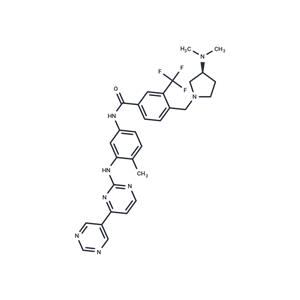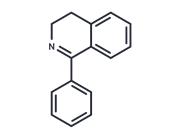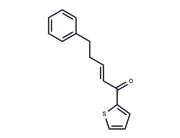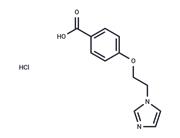| Name | Bafetinib |
| Description | Bafetinib (INNO-406) (INNO-406) is an effective and specific dual Bcr-Abl/Lyn inhibitor (IC50: 5.8/19 nM), and no inhibition of the phosphorylation of the T315I mutant and less effective to c-Kit and PDGFR. |
| Cell Research | K562, BaF3/wt, BaF3/E255K, and BaF3/T315I cells are plated at 1 × 103 in 96-well plates, whereas KU812 and U937 cells are plated at 5 × 103 in 96-well plates. Cells are incubated with serial dilutions of Bafetinib for 3 days. Cell proliferation is measured by MTT (3-(4,5-dimethylthiazol-2-yl)-2,5-diphenyltetrazolium bromide; Nacalai Tesque) assay, and the 50% inhibitory concentration (IC50) values are calculated by fitting the data to a logistic curve. (Only for Reference) |
| Kinase Assay | Kinase assay : Bcr-Abl kinase assays are performed in 25 μL of reaction mixture containing 250 μM peptide substrate, 740 Bq/μL [γ-33P]ATP, and 20 μM cold adenosine triphosphate (ATP) by using the SignaTECT protein tyrosine kinase assay system. Each Bcr-Abl kinase is used at a concentration of 10 nM. Kinase assays for Abl, Src, and Lyn are carried out with an enzyme-linked immunosorbent assay (ELISA) kit. The inhibitory effects of NS-187 against 79 tyrosine kinases are tested with KinaseProfiler. |
| In vitro | Bafetinib blocks WT Bcr-Abl autophosphorylation and its downstream kinase activity with IC50 of 11 nM and 22 nM in K562 and 293T cells, respectively. Bafetinib suppresses the growth of the Bcr-Abl-positive cell lines including K562, KU812, and BaF3/wt cells potently without effects on the proliferation of the Bcr-Abl-negative U937 cell line. Moreover, Bafetinib exhibits a dose-dependent antiproliferative effect against Bcr-Abl point mutant cell lines, such as BaF3/E255K cells. [1] In Bcr-Abl+ leukemia cell lines, Bafetinib induces both caspase-mediated and caspase-independent cell death by blocking the phosphorylation of Bcr-Abl. [2] |
| In vivo | In Bcr-Abl–positive KU812 mouse model, Bafetinib (0.2 mg/kg/day) significantly inhibits tumor growth, and completely inhibits tumor growth without adverse effects at 20 mg/kg/day. For Balb/c mice, Bafetinib shows maximal tolerated dose of 200 mg/kg/d and bioavailability value (BA) of 32%. [1] In a Central nervous system (CNS) leukemia model bearing Ba/F3/wt bcr-ablGFP, Ba/F3/Q252H, or Ba/F3/M351T cells, combination treatment of Bafetinib (60 mg/kg) and cyclosporine A (CsA) (50 mg/kg) leads to more significant inhibition of leukemia growth in the brain than either Bafetinib or CsA alone. [3] |
| Storage | store at low temperature,keep away from moisture | Powder: -20°C for 3 years | In solvent: -80°C for 1 year | Shipping with blue ice. |
| Solubility Information | DMSO : 93 mg/mL (161.3 mM)
Ethanol : < 1 mg/mL (insoluble or slightly soluble)
H2O : < 1 mg/mL (insoluble or slightly soluble)
|
| Keywords | mutations | Bcr-Abl | Src | NS187 | INNO 406 | Bafetinib | NS 187 | Apoptosis | inhibit | philadelphia chromosome-positive leukemias | INNO406 | Inhibitor |
| Inhibitors Related | Stavudine | Sodium 4-phenylbutyrate | Hydroxychloroquine | Guanidine hydrochloride | Taurine | Curcumin | Oxyresveratrol | Paeonol | Naringin | Gefitinib |
| Related Compound Libraries | Bioactive Compound Library | Kinase Inhibitor Library | Tyrosine Kinase Inhibitor Library | Anti-Cancer Clinical Compound Library | Drug Repurposing Compound Library | Inhibitor Library | Anti-Aging Compound Library | Bioactive Compounds Library Max | Anti-Cancer Active Compound Library | Anti-Cancer Drug Library |

 United States
United States



